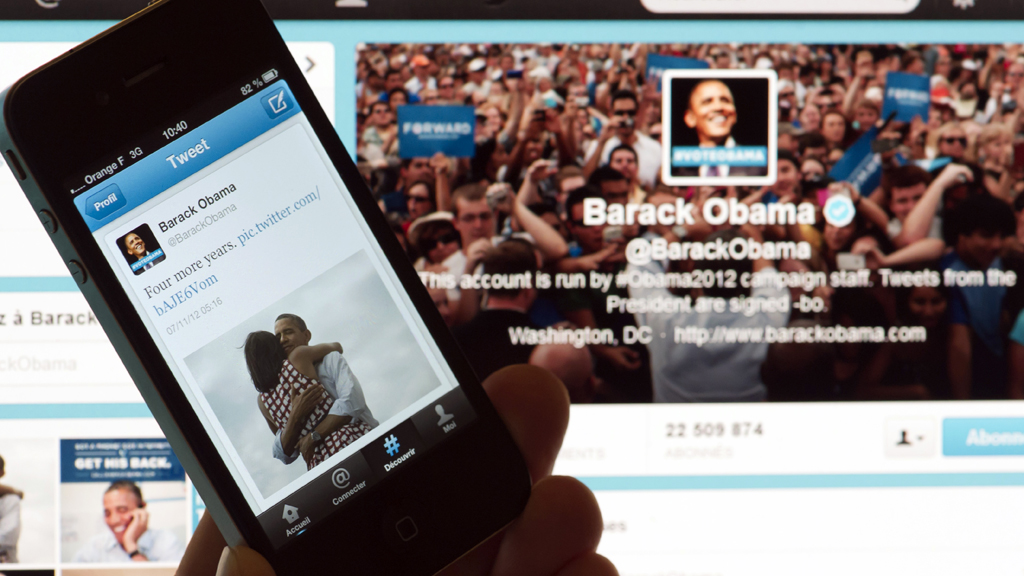US election night tops Twitter record
Barack Obama’s victory tweet becomes the most popular ever while Donald Trump attempts to rally a protest march in Washington, in a night that seals the deal for Twitter’s importance in politics.

Before taking to the stage to make his acceptance speech as president of the US, Barack Obama took to Twitter.
“This happened because of you. Thank you,” he tweeted after 11pm EST – his first acknowledgement that he had won the election.
It is fitting that Obama used the social media platform to make his first statement as president. Throughout the long race to the Whitehouse, both campaigns used Twitter, Facebook, Reddit and other internet platforms to communicate with voters, hone their candidates’ public persona and urge people to vote.
Over the next few days, political pundits and data analysts will try to decipher whether “likes” on Facebook translated to votes, and whether Obama’s success on social media helped deliver his success.
But we know straight away, the sheer scale of social media activity. There were more than 31 million election-related tweets on Tuesday night, making election night “the most tweeted about event in US political history,” said Twitter spokeswoman Rachael Horwitz. The previous record was 10 million, during the first presidential debate on 3 October.
With 20 million tweets, Election Day just became the most tweeted about event in US political history. #election2012
— Twitter Government (@gov) November 7, 2012
The conversation on Twitter surged as the results were called by news organisations, hitting a peak of 327,452 tweets per minute – around eight times the average, according to Twitter
Obama’s tweet of “four more years” became the most popular ever, amassing almost 600,000 retweets and almost 200,000 favourites at the time of writing. The same picture of the president hugging his wife Michelle, racked up well over two and a half million ‘likes’ on the president’s Facebook page.
Four more years. twitter.com/BarackObama/stâ?¦
— Barack Obama (@BarackObama) November 7, 2012
Mitt Romney has been silent on social media since the race result, and Republican voters are still holding back from saying very much on Twitter, Mark Luckie of Twitter told the Wall Street Journal. There has been a lot of gratitude expressed towards voters in the crucial swing state of Ohio, he added.
David Cameron used Twitter to congratulate “his friend” the president on his win, as did Australian prime minister Julia Gillard and the Malaysian prime minister Mohd Najib Tun Razak.
‘Stop this travesty’
The 2012 campaign is already going down in history as the first where Twitter played such an important role. Top campaign advisers like Eric Fehrnstrom for Mitt Romney, and David Axelrod for Barack Obama, engaged in Twitter battles through the year and social media websites were often the first place news broke, as so many political reporters and campaign staff used the forums to debate. Some top news stories were kept alive or thrust into the headlines after becoming hot topics on Twitter.
“Twitter brought people closer to almost every aspect of the election this year,” Ms Horwitz said. “From breaking news, to sharing the experience of watching the debates, to interacting directly with the candidates, Twitter became a kind of nationwide caucus.”
But as well as the love and the gratitude expressed by “Team Obama”, election night itself was not without controversy. Donald Trump, who has continually questioned Obama’s American citizenship, continued his campaign against the president and launched a tirade against democracy and the electoral college system after his preferred candidate Mitt Romney was announced the loser.
We can’t let this happen. We should march on Washington and stop this travesty. Our nation is totally divided!
— Donald J. Trump (@realDonaldTrump) November 7, 2012
This election is a total sham and a travesty. We are not a democracy!
— Donald J. Trump (@realDonaldTrump) November 7, 2012
House of Representatives shouldn’t give anything to Obama unless he terminates Obamacare.
— Donald J. Trump (@realDonaldTrump) November 7, 2012
Back in January, the Obama campaign announced plans to make a huge push on social media, building on its success in the area in 2008. Up to the final hours before polls closed, the campaign used social networking sites in a last minute push, urging voters to take to the polls.
In future elections, candidates and their campaign staffs will have to include social media as another battleground, said Democratic strategist Jamal Simmons said. “This was the first Twitter election and social media is now fully a part of our election mechanics,” he said. “Going forward candidates must have an aggressive social media strategy if they want to win.”
-
Latest news




